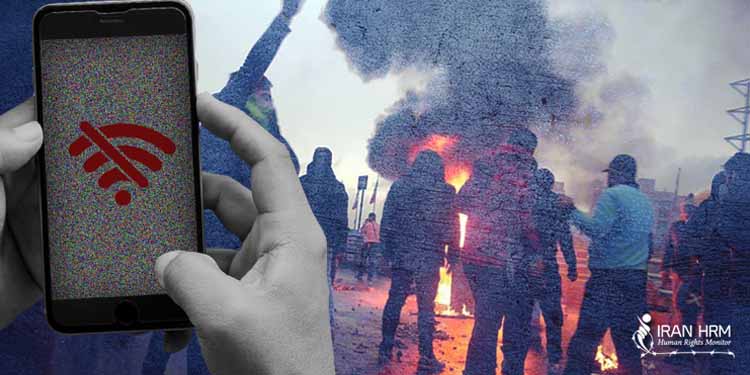Iran’s parliament coted to restrict the internet amid growing popular discontent and escalating protests, calling for Khamenei’s ouster.
Iran’s parliament on July 28, approved a bill to ban foreign messengers and step up internet censorship. During the unofficial parliamentary session, 121 members voted in favor, and 74 voted against the bill.
The parliament agreed to discuss the bill requiring social media companies to have an office in Iran and be registered with the government.
Failing to do so would see them banned by the authorities. The bill also takes control of the internet away from the civilian government and places it under the armed forces.
After the passing of the bill, it will be forwarded to the Cultural Commission, where it can be put in pilot implementation. The pilot implementation will last between three to five years before it is finalized.
The “Protection of the Rights of Cyberspace Users” project severely restricts the Internet access in Iran.
Talks of the new “bill for the Protection of the Rights of Cyberspace Users” started in early June. According to RSF, the bill is inspired by China and aims to reinforce existing digital barriers to prevent access to social networks and free internet, or in other words, “digital discrimination”.
Iran long has blocked access to many social media websites, like Facebook, Twitter and YouTube.
However, the regime’s move at the same time as the spread of popular protests in Iran shows that the authorities intend to prevent the publication of news of popular protests and the suppression of freedom of expression.
By approving the bill, Khamenei is trying to curb widespread protests by intensifying repression and censorship, especially after Ebrahim Raisi came to power as the regime’s president.
He intends to block messaging apps such as Instagram and WhatsApp, which are widely used in Iran.
What is in the new bill?
The bill imposes stricter limits on internet usage in Iran, allows state security agencies to surveil citizens more easily, and severely limits the use of popular foreign apps and online services.
Article 9 of the bill calls for a task force composed of military and intelligence agencies to control internet access in the country.
In addition to user authentication and further monitoring, the bill proposes that armed forces will manage internet gateways, and the bandwidth of foreign apps will be cut in half in comparison with national apps.
Users and apps will be banned from using blocked apps, and violations will lead to 7th-degree punishment and 6th-degree punishment in case of repeated breaches.
In Iran, 6th and 7th-degree punishments include prison, fines, lashes, and social rights deprivations.
The plan by Iran’s parliament also states that 10% of revenues from international internet traffic will be given to national apps, whereas foreign apps will be banned from business services, financial and bank services.
The full detailed plan has been published in Iran’s Laws and Regulation database.
Consequences of the bill
The proposed internet bill would not only violate Iranians’ right to access information, it would also severely hamper business operations in the country, as many are heavily reliant on foreign tools, services, and technologies for their operations, as well as other sectors that rely on online information and exchange, such as science, medicine, and education.
On July 25, 2021, the Iranian E-Commerce Scientific Association issued a statement condemning the bill:
“This bill deserves serious criticism not just because of any specific articles or clauses, but rather its whole approach and overall spirit deserves reflection and revision because not only is a significant portion of it unenforceable, it will also result in nothing but dissatisfaction and distrust among users towards domestic service providers, and put more pressure on various segments of society and small businesses and jeopardize their survival.”
Jalil Rahimi-Jahanabadi, a member of the regime’s parliament’s security commission, also said: “With the implementation of this plan, we will see bizarre chaos and disorder in our relationship with the world and the relationship between people … Did they succeed in filtering the telegram or the satellite TV in society? This pattern of thinking has not worked in North Korea nor in Latin American countries.”
A long-term plan to cutoff the outside world?
In October 2020, Iran’s Parliament passed a bill to develop a National Information Network (intranet) plan. The National Information Network’s “master engineering design” was approved on September 15 by Iran’s Supreme Council of Cyberspace (ISCC) after it was confirmed by the regime’s Supreme Leader, Ali Khamenei.
The Iranian regime has spent years pursuing a plan to build a domestic intranet separate from the global internet for security and censorship purposes called the “National Network.” Human rights organizations have expressed concern over the National Information Network plan, saying that Iranians will be denied freedom of information. They say the main goal of the NIN is to cutoff Iranians from the world.
Iran is ranked 174th out of 180 countries in RSF’s 2021 World Press Freedom Index.
In his Nowruz speech, Khamenei gave the green light to limit cyberspace as much as possible.
“Well, the necessary regulations are unfortunately not observed in cyberspace despite all my emphases. In certain aspects, cyberspace is completely free of any supervision. Those who are in charge should be careful. All countries in the world are controlling their cyberspace, but we are proud of letting it roam freely… Cyberspace should be managed. The people should be able to use it freely and this is completely alright, but this instrument should not be put at the disposal of the enemy so that he will conspire against the country and the nation.” (Khamenei’s website – March 21, 2021)











